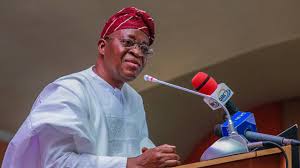About nine months after it was inaugurated by the immediate past minister of state for water transport, Prince Okechukwu Emeka, the Cabotage law review committee has submitted its report to the incumbent minister of transport, Alhaji Ibrahim Isa Bio.
The report which contains strong recommendations about how to ensure that indigenous ship owners benefit more form the Cabotage law however lampooned the Nigerian Maritime Administration and Safety Agency (NIMASA) for its inability to implement details of the law.
NIMASA is the implementing agency for Cabotage, but the committee which is headed by Senator Ugochukwu Uba (a one-time chairman, Senate Committee on marine transport) scored the agency low.
“The implementing Agencies lack the capacity to enforce the Act. There is a dearth of human and material resources to implement Cabotage. The institutions charged with implementing the Act are therefore weak and incapable of effectively delivering on the objectives of the Act and the expectation of the promoters”, the report says.
The committee which drew its membership from stakeholders noted in its report that it went round the country to assess implementation of Cabotage law and also travelled to Malaysia and United States of America to compare notes, but said in the report the Nigeria has deviated from what obtains in other Cabotage climes.
The report also faulted the implementation of the very strategic waiver clause, saying that NIMASA is more interested in collecting waiver application fess rather than in taking advantage of the clause to secure opportunities for unemployed seafarers.
Giving an insight into how the purpose of the waiver clause has been defeated, the report says that “The vessels starts operating before their waiver applications are approved. Some even complete their contracts and leave without their waiver application being approved. This makes the enforcement process unworkable and defeats the need for prior requirement for waiver before operating”.
The report however contained far-reaching recommendations about how to make the law workable and make it possible for indigenous ship owners to take advantage of the law which was enacted and assented to in 2003 by former President Olusegun Obasanjo.
Members of the committee were drawn from: Federal Ministry of Transportation, Federal Ministry of Finance, Federal Ministry of Energy (now Petroleum). It also had representation from Water Transportation agencies such as Nigerian Maritime Administration and Safety Agency (NIMASA), Nigerian Ports Authority (NPA), National Inland Waterways Authority (NIWA) etc. The private sector as well as labour had representation through Indigenous Ship Owners Association (ISAN), Master Mariners and Water Transport Senior Staff Association.
(See Executive Summary of report on page 9)
















Discussion about this post